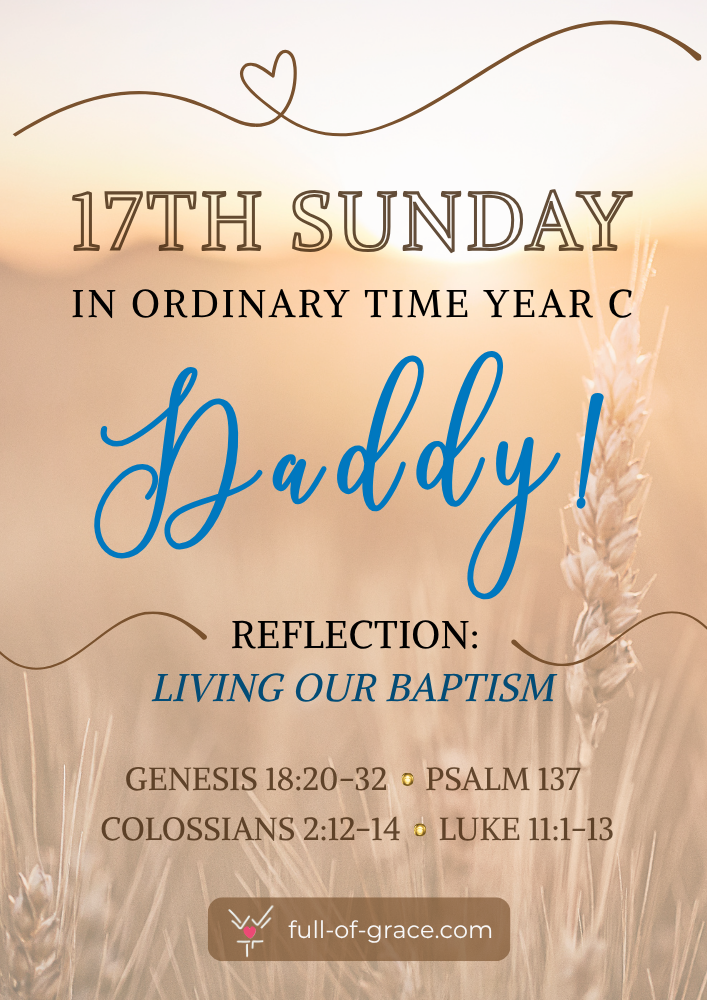A Reflection for the 17th Sunday in Ordinary Time
What Do We Remember from Our Baptism?
I was three months and four days old when I was brought to the church for my baptism. Like most of us, I have no memory of that sacred moment when water poured over my tiny head, when I was claimed as God’s beloved child, when I was wrapped in white cloth and given a candle to symbolize the Light of the World now dwelling within me.

We tend to say “I was baptized”—past tense, something that happened to us once upon a time. But Paul reminds the Colossians (and us) that baptism is present reality: we are buried with Christ, we are raised with him, we are forgiven completely. The debt has been canceled, nailed to the cross. We don’t need to earn our way back into God’s good graces through elaborate practices or perfect performance. We already belong.
But belonging to whom? What kind of Father have we been claimed by?
Abraham’s Journey: From Betrayal to Trust
Picture young Abraham in his father Terah’s idol shop in ancient Mesopotamia. The rabbinical stories tell us that Abraham’s father was not only an idol worshipper—he made his living selling these false gods to others. One day, left alone in the shop, Abraham took a stick and smashed all the statues except the largest one, placing the stick in its hand. When Terah returned and demanded an explanation, Abraham cleverly replied that the idols had fought among themselves. But instead of seeing the wisdom in his son’s revelation about the powerlessness of these false gods, Terah betrayed him—turning him over to King Nimrod to be thrown into a fiery furnace.

Imagine that betrayal. The very person who should have protected him, defended him, stood by him—instead handed him over to his enemies. Abraham learned early that earthly fathers can fail, betray, abandon.
Yet somehow, miraculously, Abraham discovered that the God who called him out of Ur was different. Walking alongside divine visitors on that dusty road from Mamre, Abraham found himself doing something extraordinary: negotiating with the Almighty. “What if there are fifty righteous people in Sodom? What if there are forty-five? Forty? Thirty? Twenty? Ten?”
Watch Abraham in this moment. There’s no cowering, no groveling, no fear of divine wrath. Instead, there’s the boldness of a beloved child approaching a trustworthy father. Abraham has discovered something revolutionary: God can be reasoned with, appealed to, even challenged—not because God is weak, but because God is love.
The Daddy Jesus Knew
Two thousand years later, Jesus would give this discovery a name: “Abba.” When his disciples asked him to teach them to pray, Jesus began with that most intimate of words—not the formal “Father” we often hear in translation, but “Daddy,” the word a small child uses when running into loving arms.

Why do we shy away from this translation? Perhaps because we’ve forgotten what Abraham learned: that God delights in our approach, welcomes our concerns, listens patiently to our persistent prayers. We’ve turned prayer into a formal audience with a distant monarch rather than an intimate conversation with a loving Daddy who can’t wait to hear from us.
Finding Our Courage
Abraham’s story teaches us something profound about prayer and relationship with God. The man who learned he couldn’t trust his earthly father discovered he could completely trust his heavenly one. The God who listened as Abraham bargained from fifty down to ten righteous people is the same God who invites us to bring our daily bread concerns, our forgiveness needs, our fears about evil.

We don’t need elaborate spiritual practices or perfect religious performance. Paul reminds us the debt is already canceled. We don’t need to earn God’s attention through persistence alone—though God welcomes even that. What we need is to rediscover what Abraham found on that road to Sodom: we can approach God with the confidence of beloved children.
The gospel tells us that even if someone won’t help for friendship’s sake, they’ll respond to persistence. But here’s the beautiful truth: God is our friend. God is our loving Daddy. The persistence isn’t needed to change God’s heart—it’s there to reassure our own hesitant hearts that we really are welcomed, really are heard, really are loved.
Living Our Baptism
When we were baptized—whether at three months old or later—we were claimed by the God Abraham discovered, the Daddy Jesus knew. We became part of a story that began with a man brave enough to smash idols and bold enough to bargain with the Divine.
Our baptism means we don’t have to earn our place in God’s heart. We’re already there. We don’t have to perform perfectly to be heard. We’re already welcomed. We don’t have to fear approaching with our needs, our concerns, our intercessions for others. We’re invited into the same intimate conversation Abraham began on that dusty road.

Today, in our prayer, in our daily bread concerns, in our forgiveness needs, in our fears and hopes—we can approach with Abraham’s boldness and Jesus’ intimacy. We can call God what God truly is: not just Father, but Daddy. Not just Creator, but the loving parent who delights in every word we speak, every concern we bring, every moment we choose trust over fear.
This is what our baptism means. This is who we are. This is the loving Daddy who has been waiting patiently for us to come home to the truth Abraham discovered and Jesus proclaimed: we are beloved, we are welcomed, we are heard.















2 thoughts on “From Betraying Father to Loving Daddy – Reflection on Sunday 17OT_C”